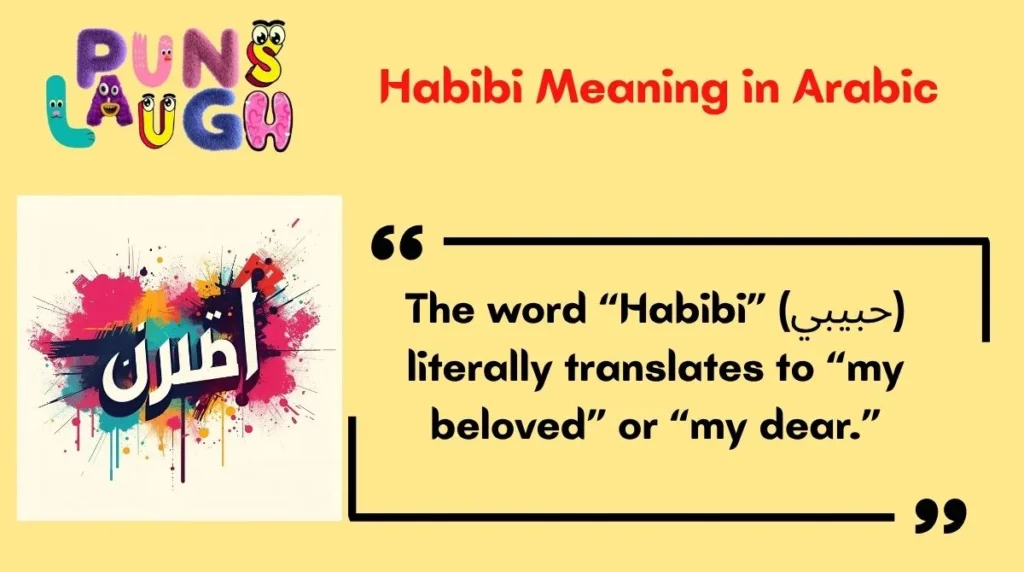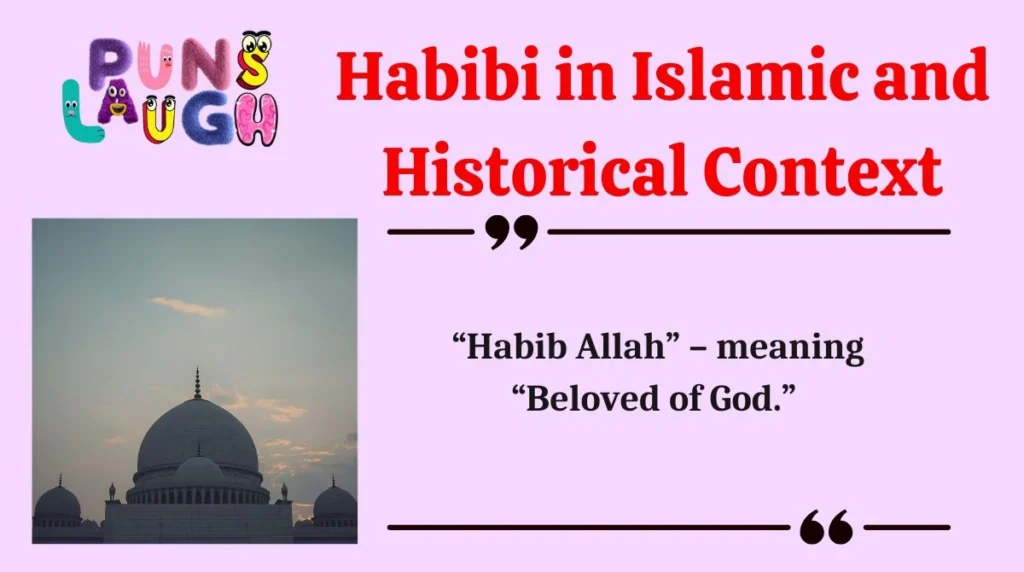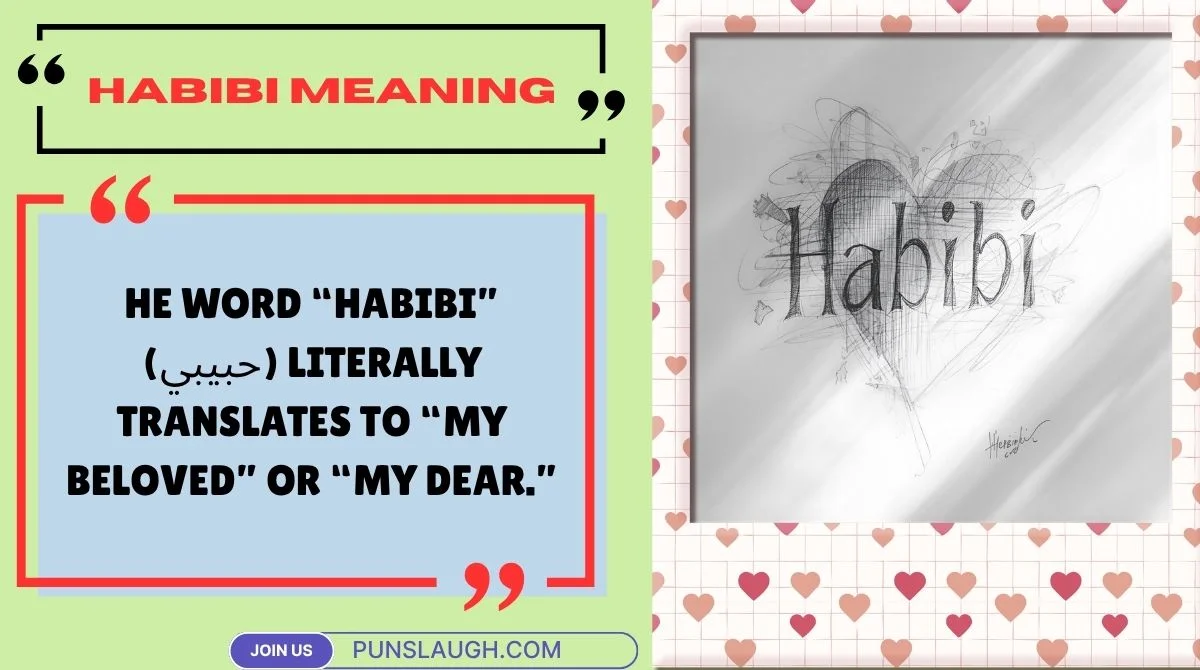“Habibi” is one of those Arabic words that seems simple yet carries centuries of warmth, culture, and nuance.
It appears in songs, memes, and even casual texts between friends. But what does it truly mean, and how should you use it?
This guide dives deep into the meaning of Habibi, exploring its roots in Arabic, its cultural and religious layers, how it’s used today in real conversations, and why it resonates across the world.
Habibi Meaning in Arabic

The word “Habibi” (حبيبي) literally translates to “my beloved” or “my dear.”
It stems from the Arabic root ḥ-b-b (حب), which means “to love.”
- Pronunciation: ḥa-bee-bee, with a long “ee” sound in the middle.
- Gender:
- Habibi – used when addressing a male
- Habibti (حبيبتي) – used when addressing a female
In Arabic grammar, the suffix -i (ـي) indicates “my.” So Habibi literally means “my beloved (male)” and Habibti means “my beloved (female).”
Quote:
“In Arabic, endearment is often built into grammar. Adding a single letter can turn a word into an intimate expression.” – Dr. Lina Al-Khatib, Arabic linguist
Historically, the term was not just romantic. Families, friends, and even elders used it as a soft, warm address.
Everyday Usage in Arabic-Speaking Communities
In many Arabic-speaking countries, Habibi is woven into daily life.
You’ll hear it in streets, markets, family gatherings, and even at work.
Here’s how it’s commonly used:
| Situation | Example Phrase | Tone of Meaning |
|---|---|---|
| Greeting a friend | “Marhaba, Habibi!” (Hello, dear!) | Friendly, warm |
| Comforting someone | “La tkhaf, Habibi.” (Don’t worry, dear.) | Supportive, caring |
| Between parents and children | “Habibi, ta‘al hena.” (Come here, my dear.) | Tender, parental |
| Casual social settings | “Shukran, Habibi.” (Thank you, buddy.) | Light-hearted, friendly |
| Romantic partners | “Habibi, wahashtini.” (I miss you, my love.) | Intimate, affectionate |
Key point: Context and tone decide whether Habibi sounds romantic, friendly, or simply polite.
In some regions, especially the Levant (Lebanon, Syria, Jordan), it’s almost as casual as saying “buddy” or “mate.” In the Gulf, it often feels more tender and personal.
Habibi Meaning in English
There’s no perfect one-word English equivalent. Depending on the situation, Habibi might translate to:
- Darling / Sweetheart – in a romantic or affectionate tone
- Dear / Dearest – in polite or caring contexts
- Buddy / Mate / Bro – in friendly, informal contexts
Important:
Many English speakers assume it’s always romantic. That’s a common mistake. In Arabic, it’s just as often platonic or familial.
Popular Variations and Paired Phrases
Arabic often combines Habibi with other words to express different emotions.
Here are the most popular forms:
Yalla Habibi (يلا حبيبي)
Literally means “Come on, my dear!”
- Often used to urge someone to hurry.
- Common in casual conversations, songs, and playful banter.
Example:
“Yalla Habibi, we’re going to miss the bus!”
Wallah Habibi (والله حبيبي)
Means “By God, my dear” or “I swear, my dear.”
- Adds sincerity, emphasis, or a pleading tone.
- Common in both serious and joking contexts.
Ya Habibi (يا حبيبي)
Translates to “Oh, my dear”
- Often used in poetry, songs, and dramatic expressions.
- Conveys deep affection or even mild exasperation.
Shukran Habibi (شكراً حبيبي)
Means “Thank you, my dear.”
- Combines politeness with warmth.
- Common in social interactions and texting.
Hamood Habibi
A modern meme phrase that originated from a viral animated song called Hamood Habibi.
- Not part of classical Arabic.
- Used online in playful, humorous contexts.
Habibi Across Languages and Cultures
Because of migration, media, and pop culture, Habibi has traveled far beyond Arabic-speaking regions.
South Asia (Hindi & Urdu)
- In Bollywood and pop songs, it’s often romantic or flirtatious.
- Young people use it playfully in messages.
Turkish, Persian, and Other Regions
- In Turkish pop culture, Habibi is often used in songs with a romantic vibe.
- Persian speakers understand it thanks to historical Arabic influence.
Western Pop Culture
- Widely adopted in memes, music, and slang.
- Sometimes misused as a generic term for any Middle Eastern expression of affection.
Habibi in Islamic and Historical Context

The word Habib also appears in religious contexts.
Historically, Muslims often refer to Prophet Muhammad as “Habib Allah” – meaning “Beloved of God.”
This usage is deeply reverent and spiritual.
It’s important to distinguish it from the casual way the term is used in daily speech.
Habibi in Slang and Internet Culture
The internet has given Habibi a playful, even cheeky side.
- Memes on TikTok and Instagram often feature the word as a funny caption.
- Social media hashtags like #YallaHabibi or #HabibiVibes have millions of views.
- Many non-Arabic speakers use it to sound trendy or humorous.
Case Study:
The hashtag #Habibi on TikTok has surpassed hundreds of millions of views, often paired with dance videos, jokes, or romantic edits.
Gender and Relationship Nuances
A crucial aspect of using Habibi is knowing when and to whom it applies.
| Situation | Correct Form | Notes |
|---|---|---|
| Addressing a male friend | Habibi | Casual or affectionate |
| Addressing a female friend | Habibti | Avoid using Habibi for females |
| Romantic partner (male/female) | Habibi / Habibti | Tone and context matter |
| Addressing elders | Habibi / Habibti | Respectful if tone is gentle |
Tip:
For non-native speakers, use it sparingly until you’re familiar with the cultural context.
Habibi in Popular Culture
Music and Love Songs
- One of the most iconic Arabic songs is “Habibi Ya Nour El Ain” by Amr Diab (1996).
- Western hits, including EDM tracks, have borrowed the term for its catchy sound and vibe.
Movies and TV
- Appears in Arabic dramas and global cinema to signal romance or cultural authenticity.
- Often used in subtitles as “darling” or “dear.”
Social Media and Memes
- Animated edits like Hamood Habibi
- Short skits joking about friends who call everyone “Habibi”
Common Misconceptions About Habibi
- Myth: It’s always romantic.
Reality: It’s often friendly or even just polite. - Myth: Only men can use it.
Reality: Both men and women use it, but address genders correctly (Habibi vs. Habibti). - Myth: It’s too formal for casual talk.
Reality: In many Arabic-speaking regions, it’s as common as “buddy” or “dude.”
Other Arabic Terms of Endearment
Arabic is rich with words of affection. Here are some common ones:
| Term | Literal Meaning | Usage |
|---|---|---|
| Habibti | My beloved (female) | Friendly or romantic |
| Hayati | My life | Deeply affectionate |
| Rohi | My soul | Often romantic or poetic |
| Omri | My life / my age | Intimate and caring |
| Azezi | My dear / my precious | Warm and respectful |
Expert and Linguist Insights
Quote:
“Habibi is more than a word. It’s a cultural bridge, carrying warmth that transcends languages.” – Prof. Ahmed Al-Mansour, Cultural Studies Scholar
Experts highlight that the intonation of Habibi—soft, drawn-out vowels—plays a huge role in conveying affection.
FAQs About Habibi
What does Habibi truly mean?
It literally means “my beloved” but is often used more casually as “dear” or “buddy.”
Can non-Arabic speakers say Habibi?
Yes, but it’s best to use it in friendly or informal contexts and understand local norms.
Does Habibi always imply romance?
No. While it can be romantic, it’s just as common among friends and family.
What’s the difference between Habibi and Habibti?
Habibi is for males; Habibti is for females.
Is it appropriate to use Habibi in professional settings?
Usually no, unless you’re in a very casual workplace culture in an Arabic-speaking country.
Conclusion
Habibi is more than a word.
It’s a window into Arabic culture, showcasing how a single phrase can carry warmth, history, and human connection.
From the bustling streets of Cairo to TikTok trends in Los Angeles, this simple term has crossed borders, building bridges of affection and familiarity.
Understanding its meaning and using it respectfully lets you connect more genuinely with Arabic speakers and their vibrant culture.





